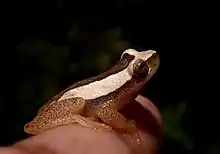Dendropsophus haddadi
Dendropsophus haddadi is a species of frog in the family Hylidae. It is endemic to eastern Brazil, with its distribution ranging from northern Espírito Santo to Bahia, Sergipe, Alagoas, Pernambuco.[2] The specific name haddadi honors Célio F. B. Haddad, a Brazilian ecologist and herpetologist.[3][4]
| Dendropsophus haddadi | |
|---|---|
 | |
| Scientific classification | |
| Domain: | Eukaryota |
| Kingdom: | Animalia |
| Phylum: | Chordata |
| Class: | Amphibia |
| Order: | Anura |
| Family: | Hylidae |
| Genus: | Dendropsophus |
| Species: | D. haddadi |
| Binomial name | |
| Dendropsophus haddadi (Bastos and Pombal, 1996) | |
| Synonyms[2] | |
|
Hyla haddadi Bastos and Pombal, 1996[3] | |
Description
Adult males measure 16–19 mm (0.6–0.7 in) and adult females 22–24 mm (0.9–0.9 in) in snout–vent length. The snout is short. The tympanum is distinct and relatively large. The canthus rostralis is distinct. The fingers and toes have rounded discs and are partially webbed. Dorsal coloration is variable, but most individuals are dark brown with white snout and stripes running laterally to the inguinal region.[3]
.jpg.webp)
Habitat and conservation
Dendropsophus haddadi occurs in coastal rainforest and in scrubby coastal "restinga" vegetation, as well as in gardens, farmland, and towns, at elevations below 650 m (2,130 ft). It breeds in permanent bonds and can be spotted on vegetation around these. It is a common and very adaptable species that is not facing any threats. It is present in many protected areas.[1]
References
- Oswaldo Luiz Peixoto, Bruno Pimenta (2004). "Dendropsophus haddadi". IUCN Red List of Threatened Species. 2004: e.T55498A11310343. doi:10.2305/IUCN.UK.2004.RLTS.T55498A11310343.en. Retrieved 14 November 2021.
- Frost, Darrel R. (2020). "Dendropsophus haddadi (Bastos and Pombal, 1996)". Amphibian Species of the World: An Online Reference. Version 6.1. American Museum of Natural History. doi:10.5531/db.vz.0001. Retrieved 29 May 2020.
- Bastos, Rogério P.; Pombal, José P. (1996). "A new species of Hyla (Anura: Hylidae) from eastern Brazil". Amphibia-Reptilia. 17 (4): 325–331. doi:10.1163/156853896X00054.
- Beolens, Bo; Watkins, Michael & Grayson, Michael (2013). The Eponym Dictionary of Amphibians. Pelagic Publishing. p. 88. ISBN 978-1-907807-42-8.
